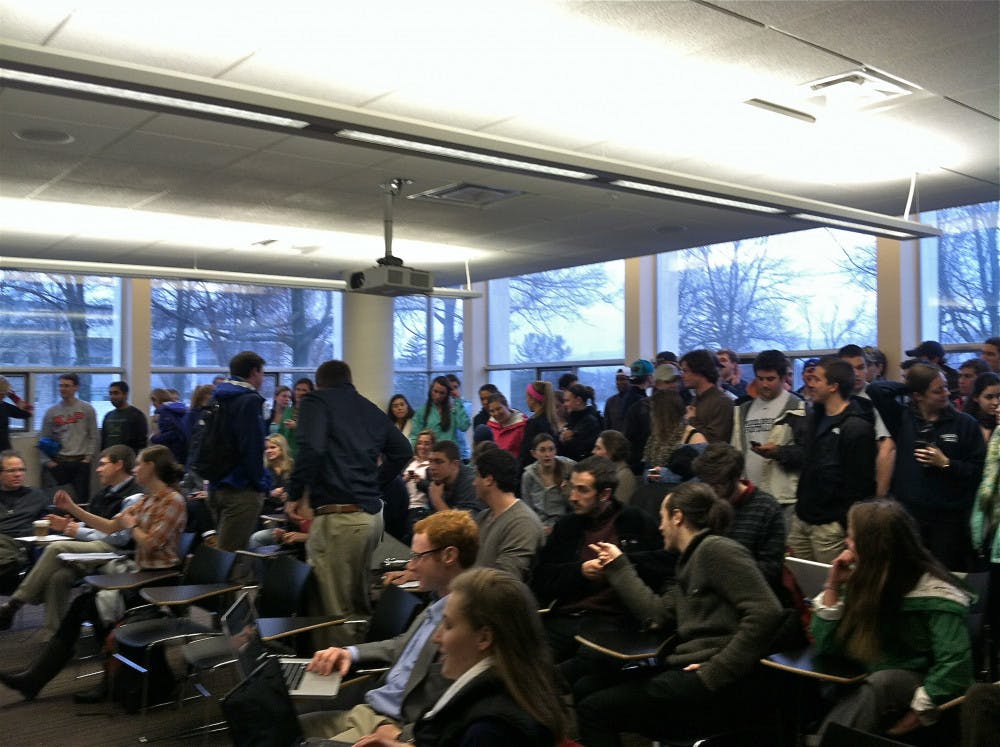On Tuesday, March 12, Community Council met to vote on the fate of Delta, formerly known as ADP. After a 30-minute open meeting and an hour of deliberation in executive session, during which only members of the Council were present, the motion to vote came to 8-8-1, thereby tabling the decision until the next meeting on Monday, March 18.
“We were not able to come to a decision today because it is a very complex issue, but I am confident that taking extra time to deliberate further will allow us to craft a decision that is ultimately best for the community,” said Student Co-Chair of Community Council Barrett Smith ’13.
Following the meeting’s adjournment, Doug Adams, associate dean of students and chair of the Residential Life Committee, a subcommittee of Community Council, emphasized that during the coming week, Delta will continue its operations as normal.
Tuesday’s meeting was packed to standing room-only, with a large student audience filling all corners of the Axinn Center’s first-floor classroom. Smith led the meeting, during which Council members were given the opportunity to ask members of Delta any questions or clarifications. Delta members were then given an open floor for five minutes.
During this time, leaders of Delta outlined changes that they would like to introduce in the future.
“Our most important point is to try and change the image of the house to the student body,” explained former Delta President Dan Lungo ’13. Current President Luke Battle ’14 was unable to attend the meeting as he was out of town for an interview.
In an interview after the meeting, Lungo clarified the challenges of changing the student body’s perception of Prescott house.
“We’re seen as this vital social scene on campus, but we also want people to understand that this is a residence — this is where we live — and we do more than just throw parties,” said Lungo.
Tuesday’s meeting convened in order to vote on the Residential Life Committee’s recommendations regarding the status of the College’s five social houses. The Council voted to continue Tavern, Xenia, the Mill and KDR for the next two academic years.
Delta’s fate, however, remains undecided. The Residential Life Committee’s biennial report recommends discontinuation of the organization due to several violations of College and IHC policy, including damage done to Prescott house, Delta’s 29-person residence; a continued pattern of throwing unregistered parties and failure to meet sexual assault training and hazing education requirements for the membership.
Although it was reported during the Feb. 25 Community Council meeting that Delta’s damages for this academic year had reached $1,800 with work orders pending, according to the report, Delta has now accrued a total of $2,592 in dorm damage, which puts Delta in violation of the $1,500 annual dorm damage limit that Community Council placed on the house after it accrued over $8,500 in damage during the 2011 - 2012 academic year.
During the meeting, Assistant Director of Custodial Services Linda Ross and Lungo both acknowledged the need for better communication between Facilities Services and Prescott house. On March 5, Delta received a $288 charge for clean up, yet Lungo explained that this was unexpected.
“The house spent over two hours cleaning on Sunday,” said Lungo. “We thought the job was done. Apparently it wasn’t, and going forward we’re going to make sure this doesn’t happen again. We were really surprised by that charge.”
Ross, who is also a member of Community Council, clarified the situation her team faced.
“The charge came from the six hours needed to finish cleaning the house in addition to the normal customary process that Facilities provides,” said Ross. “There was broken glass and the floors were very sticky.”
In the hours following the meeting, Lungo reached out to Public Safety and Facilities Services, proposing to meet as soon as possible to facilitate a stronger working relationship. The leadership also plans to work toward finding a faculty adviser, as the organization currently does not have one. In addition, Delta has thrown two registered parties since the leadership was informed of the committee’s recommendation, and Lungo also described Delta’s plans to host more daytime events in the near future.
“We want to show Community Council that we’re taking the initiative to actually enact what they recommended,” said Lungo after the meeting.
Emma Kramer ’13, a member of Delta, highlighted to Council members the difficulty of crowd control, proposing that Delta could hire Green Mountain Security or work more closely with Public Safety to help monitor party attendance. Party attendance numbers are continually high for Delta; the Community Council report describes “a large unregistered party with between 400-600 students present.”
“I can’t control a rowdy population,” explained Kramer, who has often been in charge of crowd control at the door to Delta’s parties. “We want to change the situation and control the problem before it [becomes] a real issue — before people are in our house that we don’t want to be there, [because] they might not be in a right state of mind.”
In an interview after the meeting, Lungo emphasized that the behavior of non-members at Delta functions also has an impact on the organization’s reputation.
“We need [the student body] to cooperate with us if we’re going to stay as an organization,” said Lungo. “It’s important for the student body to understand that when they come to an event, they have to be respectful to Public Safety.
Immediately following Delta’s remarks, the Council moved into an hour of executive session while a handful of members of Delta waited outside. Council members emerged from the room at 6 p.m. to announce that the decision had been tabled until its next meeting on Monday, March 18 at 4:30 p.m.
Council Tables Decision on Delta

Comments



